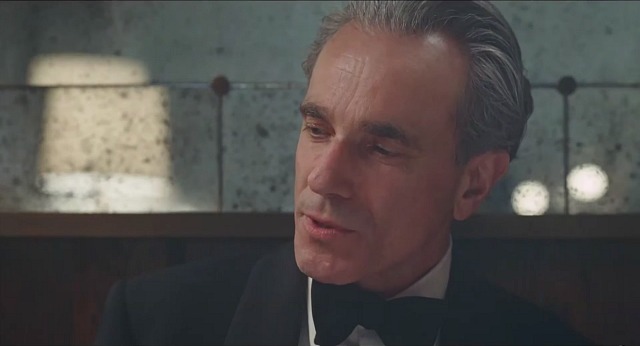Day: October 23, 2017
HE Chat: The Square‘s Ruben Ostlund
Earlier this afternoon I sat down with Ruben Ostlund, the Swedish director of The Square (Magnolia, 10.27), a brilliant art-world satire that won the Palme d’Or at the finale of last May’s Cannes Film Festival.
I captured our 27-minute chat on iPhone and uploaded it in three sections.
If you’ve seen The Square the questions I asked Ostlund will make sense, but perhaps not if you haven’t. In my book it’s easily among 2017’s finest foreign-language films. I’m trusting that Academy members will agree and nominate it for Best Foreign Language Feature, but you can never tell with that crew.
Suffice that Ostlund’s film makes fun of the insular, politically correct museum culture that can be found worldwide, although The Square‘s focus is on a cutting-edge Stockholm art museum.
As I wrote last May,” Ostlund’s precise and meticulous handling of The Square is exactly the kind of tonal delivery that I want from comedies. There isn’t a low moment (i.e., aimed at the animals) in all of it, whereas many if not most American comedies are almost all low moments.”
“The Square is a longish (142 minutes) but exquisitely dry Swedish satire, mostly set among the wealthy, museum-supporting class in Stockholm. It’s basically a serving of deft, just-right comic absurdity (the high points being two scenes in which refined p.c. swells are confronted with unruly social behaviors) that works because of unforced, low-key performances and restrained, well-honed dialogue.
“There are four stand-out moments: a post-coital confrontation moment between Danish actor Claes Bang and Elizabeth Moss, an interview with a visiting artist (Dominic West) interrupted by a guy with Tourette’s syndrome, the already notorious black-tie museum dinner “ape man” scene with simian-channeller Terry Notary, and a hilariously over-provocative YouTube ad showing a little girl and a kitten being blown to bits. The Square is worth the price for these four scenes alone.
High-Concept Bullshit
Anyone over the age of five would instantly smell trouble if a stranger on a train were to offer them $75K to do anything at all. And then they’d excuse themselves and stay as far away from Vera Farmiga as possible. There are realistic, semi-believable ways of seducing innocent parties into doing bad things for money, but the scenario in this trailer is bullshit. “Strange woman offers man $75K if he’ll do a risky thing” — one of those cheap high-concept plot hooks that young screenwriters (i.e., guys who know they have to get down to the high-voltage stuff right away) pitch all the time. Directed by Jaume Collet-Serra, who directed The Shallows. You know what told me this movie is crap? When I saw that look of wifely devotion that Elizabeth McGovern offers to husband Liam Neeson as he’s about to get on the train. That settled it — game over. Lionsgate will open The Commuter on 1.12.18.
“La La” Land
Not to cut President Donald Trump the slightest bit of slack, but we can probably assume that when he stumbled with the pronounciation of La David Johnson‘s name (as Johnson’s widow has recently claimed), it was over the first name. He probably said “David” and then checked himself with “uhhm, I mean La David” or something in that realm. I don’t know that this happened, but what are the odds that Trump stumbled with the pronunciation of “Johnson”?
Well, I experienced the same kind of stumble when I attended a party for Crown Heights last July. I was talking to a publicist about Lakeith Stanfield, and I said “Keith” only to stop mid-sentence and say “I mean LaKeith”. I mentioned right away that the “La” (an African-American culture thing) was a relatively recent add-on as Stanfield’s Wikipage was still referring to him as “Keith.” (Not now — the spelling has since been updated.) And keep in mind that Lakeith has no space between “La” and “Keith” while Johnson’s first name is spelled “La David.” Given the recent “La” prefix add-ons and general spelling flexibility, it seems as if a little stumbling might be forgivable.
Name Five Presidents
George H.W. Bush turned 93 last June. I don’t know what’s going on with the poor guy, but one look and you’re reminded of that old Bette Davis saying that “old age isn’t for sissies.” I’ve long sensed that I’ll follow in the steps of Kirk Douglas or Norman Lloyd, but remind me to take an overdose of something before I get to this stage.

Reynolds Woodcock’s Odd Passion
Initial reaction #1: World-class actresses have always had a certain X-factor quality, an unmistakable spark of passion or depth of feeling when the camera gazed upon them. They didn’t have to be classically beautiful (i.e., Bette Davis) or boudoir sexy, but they had to have that combustible quality. I realize that all cultures are constantly evolving and that aesthetic standards change with them, but Vicky Krieps, no offense, doesn’t have that “it” quality. She just doesn’t.
Krieps strikes me as an arresting actress as far as the task of conveying complex emotions is concerned, but she clearly lacks magnetism. She reminds me in some ways of Brief Encounter‘s Celia Johnson — an emotionally relatable but spark-free actress with plain, unremarkable features. In the ’50s, or the period in which Phantom Thread occurs, Krieps might have had trouble being cast as a housemaid or shopkeeper or a barely-noticed office clerk, much less as the costar of a film about an intense, highly-charged relationship.
Key trailer quotes: “When I was a boy I would hide things in the liners of garments…things that only I knew were there….secrets.” “So why are you not married?” “May I warn you of something?” “Perhaps I’m looking for trouble.” “Stop!” “There’s an air of quiet death in this house.” “You’re not cursed, you’re loved.” “What game? What precisely is the nature of my game?” “Are you thinking of ruining my evening? And possibly my entire life?” “Stop it!” “Whatever you do, think carefully.”
Initial reaction #2: I’m not feeling the crazy in this trailer. The theme seems to be “leave this artist alone to create what he needs to create…if you fuck with his system or his behavior or obsessive work patterns, you will bring on nothing but trouble.” It seems to basically boil down to Rex Harrison‘s song of complaint and lament in My Fair Lady, “An Ordinary Man.” Key Lyric: “Let a woman in your life, and your serenity is through.”
An older, graying, work-obsessed couturier named Reynolds Woodcock (Daniel Day Lewis) falls for a significantly younger but plain-featured woman named Alma (Vicky Krieps), and at first everything is delightful. But as the initial passion begins to recede it becomes clear that Alma has certain feelings and convictions that clash with Reynolds’ realm. Reynolds’ sister Cyril (Lesley Manville) quietly warns Alma not to interfere with his creative process as Alma begins to reveal a dark, possibly even perverse side to her nature. What began as a love affair begins to transform into a battle of wills and passions.
Initial reaction #3: Where are the hints of Phantom Thread being a classy, upmarket Fifty Shades of Grey, as rumors have had it?
Initial reaction #4: Perhaps Paul Thomas Anderson‘s point in casting the unremarkable looking Krieps was to convey something about the sometimes curious nature of love and passion. You may not see or sense the thing that lights Reynolds Woodcock’s fire, but R.W. certainly does, and that’s all that matters as far as the watching of this film is concerned.



